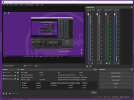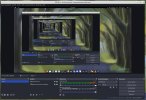15:36:27.285: Using EGL/X11
15:36:27.285: CPU Name: AMD Ryzen 7 5800X 8-Core Processor
15:36:27.285: CPU Speed: 4850.072MHz
15:36:27.286: Physical Cores: 8, Logical Cores: 16
15:36:27.286: Physical Memory: 64217MB Total, 60001MB Free
15:36:27.286: Kernel Version: Linux 6.9.9-200.fc40.x86_64
15:36:27.286: Flatpak Branch: stable
15:36:27.286: Flatpak Arch: x86_64
15:36:27.286: Flatpak Runtime: runtime/org.kde.Platform/x86_64/6.6
15:36:27.286: App Extensions:
15:36:27.286: - com.obsproject.Studio.Plugin.GStreamerVaapi
15:36:27.286: - com.obsproject.Studio.Plugin.Gstreamer
15:36:27.286: - com.obsproject.Studio.Plugin.OBSVkCapture
15:36:27.286: - org.freedesktop.LinuxAudio.Plugins.TAP
15:36:27.286: - org.freedesktop.LinuxAudio.Plugins.swh
15:36:27.286: - com.obsproject.Studio.Locale
15:36:27.286: Runtime Extensions:
15:36:27.286: - org.freedesktop.Platform.GL.default
15:36:27.286: - org.freedesktop.Platform.GL.nvidia-555-58-02
15:36:27.286: - org.freedesktop.Platform.openh264
15:36:27.286: - org.kde.KStyle.Adwaita
15:36:27.286: - org.kde.PlatformTheme.QGnomePlatform
15:36:27.286: - org.kde.WaylandDecoration.QAdwaitaDecorations
15:36:27.286: - org.kde.Platform.Locale
15:36:27.286: - org.freedesktop.Platform.GL.default
15:36:27.286: Flatpak Framework Version: 1.15.8
15:36:27.286: Desktop Environment: GNOME (gnome-xorg)
15:36:27.286: Session Type: x11
15:36:27.286: Window System: X11.0, Vendor: The X.Org Foundation, Version: 1.20.14
15:36:27.287: Qt Version: 6.6.3 (runtime), 6.6.3 (compiled)
15:36:27.287: Portable mode: false
15:36:27.325: OBS 30.2.1 (linux)
15:36:27.325: ---------------------------------
15:36:27.325: ---------------------------------
15:36:27.325: audio settings reset:
15:36:27.325: samples per sec: 48000
15:36:27.325: speakers: 2
15:36:27.325: max buffering: 960 milliseconds
15:36:27.325: buffering type: dynamically increasing
15:36:27.327: ---------------------------------
15:36:27.327: Initializing OpenGL...
15:36:27.578: Loading up OpenGL on adapter NVIDIA Corporation NVIDIA GeForce RTX 2070 SUPER/PCIe/SSE2
15:36:27.578: OpenGL loaded successfully, version 3.3.0 NVIDIA 555.58.02, shading language 3.30 NVIDIA via Cg compiler
15:36:27.599: ---------------------------------
15:36:27.599: video settings reset:
15:36:27.599: base resolution: 2560x1440
15:36:27.599: output resolution: 2560x1440
15:36:27.599: downscale filter: Bicubic
15:36:27.599: fps: 60/1
15:36:27.599: format: NV12
15:36:27.599: YUV mode: Rec. 709/Partial
15:36:27.599: NV12 texture support enabled
15:36:27.599: P010 texture support not available
15:36:27.649: Audio monitoring device:
15:36:27.649: name: Standard
15:36:27.649: id: default
15:36:27.649: ---------------------------------
15:36:27.673: No AJA devices found, skipping loading AJA UI plugin
15:36:27.673: Failed to initialize module 'aja-output-ui.so'
15:36:27.694: No AJA devices found, skipping loading AJA plugin
15:36:27.694: Failed to initialize module 'aja.so'
15:36:27.966: [pipewire] Available capture sources:
15:36:27.966: [pipewire] - Monitor source
15:36:27.966: [pipewire] - Window source
15:36:28.009: v4l2loopback not installed, virtual camera not registered
15:36:28.018: [obs-browser]: Version 2.23.5
15:36:28.018: [obs-browser]: CEF Version 103.0.5060.134 (runtime), 103.0.0-5060-shared-textures.2594+g17f8588+chromium-103.0.5060.134 (compiled)
15:36:28.048: NVENC supported
15:36:28.048: VAAPI: Failed to initialize display in vaapi_device_h264_supported
15:36:28.048: FFmpeg VAAPI H264 encoding not supported
15:36:28.048: VAAPI: Failed to initialize display in vaapi_device_av1_supported
15:36:28.048: FFmpeg VAAPI AV1 encoding not supported
15:36:28.048: VAAPI: Failed to initialize display in vaapi_device_hevc_supported
15:36:28.048: FFmpeg VAAPI HEVC encoding not supported
15:36:28.128: [obs-websocket] [obs_module_load] you can haz websockets (Version: 5.5.2 | RPC Version: 1)
15:36:28.128: [obs-websocket] [obs_module_load] Qt version (compile-time): 6.6.3 | Qt version (run-time): 6.6.3
15:36:28.128: [obs-websocket] [obs_module_load] Linked ASIO Version: 103002
15:36:28.132: [obs-websocket] [obs_module_load] Module loaded.
15:36:28.156: [linux-vkcapture] plugin loaded successfully (version 1.5.1)
15:36:28.189: [obs-gstreamer] build: 7dd3e69, gst-runtime: 1.22.12
15:36:28.410: [obs-vaapi] version: 0.4.1, gst-runtime: 1.22.12
15:36:28.411: ---------------------------------
15:36:28.411: Loaded Modules:
15:36:28.411: obs-vaapi.so
15:36:28.411: obs-gstreamer.so
15:36:28.411: linux-vkcapture.so
15:36:28.411: text-freetype2.so
15:36:28.411: rtmp-services.so
15:36:28.411: obs-x264.so
15:36:28.411: obs-websocket.so
15:36:28.411: obs-webrtc.so
15:36:28.411: obs-vst.so
15:36:28.411: obs-transitions.so
15:36:28.411: obs-qsv11.so
15:36:28.411: obs-outputs.so
15:36:28.411: obs-libfdk.so
15:36:28.411: obs-filters.so
15:36:28.411: obs-ffmpeg.so
15:36:28.411: obs-browser.so
15:36:28.411: linux-v4l2.so
15:36:28.411: linux-pulseaudio.so
15:36:28.411: linux-pipewire.so
15:36:28.411: linux-jack.so
15:36:28.411: linux-capture.so
15:36:28.411: image-source.so
15:36:28.411: frontend-tools.so
15:36:28.411: ---------------------------------
15:36:28.411: ---------------------------------
15:36:28.411: Available Encoders:
15:36:28.411: Video Encoders:
15:36:28.411: - ffmpeg_svt_av1 (SVT-AV1)
15:36:28.411: - ffmpeg_aom_av1 (AOM AV1)
15:36:28.411: - jim_nvenc (NVIDIA NVENC H.264)
15:36:28.411: - jim_hevc_nvenc (NVIDIA NVENC HEVC)
15:36:28.411: - jim_av1_nvenc (NVIDIA NVENC AV1)
15:36:28.411: - obs_x264 (x264)
15:36:28.411: - gstreamer-encoder-h264 (GStreamer Encoder H.264)
15:36:28.411: - gstreamer-encoder-h265 (GStreamer Encoder H.265)
15:36:28.411: Audio Encoders:
15:36:28.411: - ffmpeg_aac (FFmpeg AAC)
15:36:28.411: - ffmpeg_opus (FFmpeg Opus)
15:36:28.411: - ffmpeg_pcm_s16le (FFmpeg PCM (16 Bit))
15:36:28.411: - ffmpeg_pcm_s24le (FFmpeg PCM (24 Bit))
15:36:28.411: - ffmpeg_pcm_f32le (FFmpeg PCM (32 Bit Float))
15:36:28.411: - ffmpeg_alac (FFmpeg ALAC (24 Bit))
15:36:28.411: - ffmpeg_flac (FFmpeg FLAC (16 Bit))
15:36:28.411: - libfdk_aac (libfdk AAC)
15:36:28.411: ==== Startup complete ===============================================
15:36:28.456: All scene data cleared
15:36:28.456: ------------------------------------------------
15:36:28.461: pulse-input: Server name: 'PulseAudio (on PipeWire 1.0.7) 15.0.0'
15:36:28.461: pulse-input: Audio format: s32le, 48000 Hz, 2 channels
15:36:28.461: pulse-input: Started recording from 'alsa_output.pci-0000_29_00.1.hdmi-stereo-extra1.monitor' (default)
15:36:28.461: [Loaded global audio device]: 'Desktop-Audio'
15:36:28.461: pulse-input: Server name: 'PulseAudio (on PipeWire 1.0.7) 15.0.0'
15:36:28.461: pulse-input: Audio format: s16le, 48000 Hz, 1 channels
15:36:28.462: pulse-input: Started recording from 'alsa_input.usb-C-Media_Electronics_Inc._TONOR_TC30_Audio_Device_20220524-00.mono-fallback' (default)
15:36:28.462: [Loaded global audio device]: 'Mikrofon-/AUX-Audio'
15:36:28.462: PipeWire initialized
15:36:28.463: Switched to scene 'Szene'
15:36:28.463: ------------------------------------------------
15:36:28.463: Loaded scenes:
15:36:28.463: - scene 'Szene':
15:36:28.463: - source: 'Bildschirmaufnahme (PipeWire)' (pipewire-screen-capture-source)
15:36:28.463: - source: 'Spielaufnahme' (vkcapture-source)
15:36:28.463: ------------------------------------------------
15:36:28.530: [pipewire] Screencast session created
15:36:28.540: [pipewire] Asking for monitor and window
15:36:28.569: [pipewire] source selected, setting up screencast
15:36:28.599: [pipewire] Server version: 1.0.7
15:36:28.599: [pipewire] Library version: 0.3.83
15:36:28.599: [pipewire] Header version: 0.3.83
15:36:28.599: [pipewire] Created stream 0x55afb55686f0
15:36:28.599: [pipewire] Stream 0x55afb55686f0 state: "connecting" (error: none)
15:36:28.599: [pipewire] Playing stream 0x55afb55686f0
15:36:28.599: [pipewire] Stream 0x55afb55686f0 state: "paused" (error: none)
15:36:28.606: [pipewire] Negotiated format:
15:36:28.606: [pipewire] Format: 12 (Spa:Enum:VideoFormat:BGRA)
15:36:28.606: [pipewire] Size: 2560x1440
15:36:28.606: [pipewire] Framerate: 0/1
15:36:28.626: [pipewire] Stream 0x55afb55686f0 state: "streaming" (error: none)
15:36:29.032: adding 21 milliseconds of audio buffering, total audio buffering is now 21 milliseconds (source: Desktop-Audio)
15:36:29.032:
15:36:29.096: adding 21 milliseconds of audio buffering, total audio buffering is now 42 milliseconds (source: Mikrofon-/AUX-Audio)
15:36:29.096:
15:37:00.351: ==== Shutting down ==================================================
15:37:00.419: pulse-input: Stopped recording from 'alsa_output.pci-0000_29_00.1.hdmi-stereo-extra1.monitor'
15:37:00.419: pulse-input: Got 1277 packets with 1532400 frames
15:37:00.419: pulse-input: Stopped recording from 'alsa_input.usb-C-Media_Electronics_Inc._TONOR_TC30_Audio_Device_20220524-00.mono-fallback'
15:37:00.419: pulse-input: Got 1274 packets with 1528800 frames
15:37:00.419: [pipewire] Stream 0x55afb55686f0 state: "paused" (error: none)
15:37:00.424: [pipewire] Stream 0x55afb55686f0 state: "unconnected" (error: none)
15:37:00.462: [linux-vkcapture] destroy
15:37:00.477: All scene data cleared
15:37:00.477: ------------------------------------------------
15:37:00.520: [linux-vkcapture] plugin unloaded
15:37:00.521: [obs-websocket] [obs_module_unload] Shutting down...
15:37:00.521: Tried to call obs_frontend_remove_event_callback with no callbacks!
15:37:00.521: [obs-websocket] [obs_module_unload] Finished shutting down.
15:37:00.525: [Scripting] Total detached callbacks: 0
15:37:00.525: Freeing OBS context data
15:37:00.550: == Profiler Results =============================
15:37:00.550: run_program_init: 1520.06 ms
15:37:00.550: ┣OBSApp::AppInit: 14.023 ms
15:37:00.550: ┃ ┗OBSApp::InitLocale: 3.259 ms
15:37:00.550: ┗OBSApp::OBSInit: 1216.43 ms
15:37:00.550: ┣obs_startup: 1.368 ms
15:37:00.550: ┗OBSBasic::OBSInit: 1176.98 ms
15:37:00.550: ┣OBSBasic::InitBasicConfig: 0.092 ms
15:37:00.550: ┣OBSBasic::ResetAudio: 0.205 ms
15:37:00.550: ┣OBSBasic::ResetVideo: 324.028 ms
15:37:00.550: ┃ ┗obs_init_graphics: 274.196 ms
15:37:00.550: ┃ ┗shader compilation: 21.152 ms
15:37:00.550: ┣OBSBasic::InitOBSCallbacks: 0.004 ms
15:37:00.550: ┣OBSBasic::InitHotkeys: 0.017 ms
15:37:00.550: ┣obs_load_all_modules2: 761.826 ms
15:37:00.550: ┃ ┣obs_init_module(aja-output-ui.so): 0.091 ms
15:37:00.550: ┃ ┣obs_init_module(aja.so): 0.048 ms
15:37:00.550: ┃ ┣obs_init_module(frontend-tools.so): 63.731 ms
15:37:00.550: ┃ ┣obs_init_module(image-source.so): 0.007 ms
15:37:00.550: ┃ ┣obs_init_module(linux-capture.so): 0.38 ms
15:37:00.550: ┃ ┣obs_init_module(linux-jack.so): 0.002 ms
15:37:00.550: ┃ ┣obs_init_module(linux-pipewire.so): 3.94 ms
15:37:00.550: ┃ ┣obs_init_module(linux-pulseaudio.so): 0.006 ms
15:37:00.550: ┃ ┣obs_init_module(linux-v4l2.so): 18.305 ms
15:37:00.550: ┃ ┣obs_init_module(obs-browser.so): 0.044 ms
15:37:00.550: ┃ ┣obs_init_module(obs-ffmpeg.so): 21.326 ms
15:37:00.550: ┃ ┃ ┗nvenc_check: 12.404 ms
15:37:00.550: ┃ ┣obs_init_module(obs-filters.so): 0.018 ms
15:37:00.550: ┃ ┣obs_init_module(obs-libfdk.so): 0.001 ms
15:37:00.550: ┃ ┣obs_init_module(obs-outputs.so): 0.003 ms
15:37:00.550: ┃ ┣obs_init_module(obs-qsv11.so): 0.933 ms
15:37:00.550: ┃ ┣obs_init_module(obs-transitions.so): 0.007 ms
15:37:00.550: ┃ ┣obs_init_module(obs-vst.so): 0.003 ms
15:37:00.550: ┃ ┣obs_init_module(obs-webrtc.so): 0.011 ms
15:37:00.551: ┃ ┣obs_init_module(obs-websocket.so): 3.826 ms
15:37:00.551: ┃ ┣obs_init_module(obs-x264.so): 0.001 ms
15:37:00.551: ┃ ┣obs_init_module(rtmp-services.so): 1.048 ms
15:37:00.551: ┃ ┣obs_init_module(text-freetype2.so): 0.019 ms
15:37:00.551: ┃ ┣obs_init_module(linux-vkcapture.so): 0.099 ms
15:37:00.551: ┃ ┣obs_init_module(obs-gstreamer.so): 213.093 ms
15:37:00.551: ┃ ┗obs_init_module(obs-vaapi.so): 0.477 ms
15:37:00.551: ┣OBSBasic::InitService: 2.327 ms
15:37:00.551: ┣OBSBasic::ResetOutputs: 0.211 ms
15:37:00.551: ┣OBSBasic::CreateHotkeys: 0.023 ms
15:37:00.551: ┣OBSBasic::InitPrimitives: 0.203 ms
15:37:00.551: ┗OBSBasic::Load: 52.748 ms
15:37:00.551: obs_hotkey_thread(25 ms): min=0.062 ms, median=0.075 ms, max=0.312 ms, 99th percentile=0.115 ms, 100% below 25 ms
15:37:00.551: audio_thread(Audio): min=0.002 ms, median=0.018 ms, max=0.226 ms, 99th percentile=0.065 ms
15:37:00.551: obs_graphics_thread(16.6667 ms): min=0.084 ms, median=0.518 ms, max=90.355 ms, 99th percentile=4.842 ms, 99.7965% below 16.667 ms
15:37:00.551: ┣tick_sources: min=0 ms, median=0.002 ms, max=0.026 ms, 99th percentile=0.006 ms
15:37:00.551: ┣output_frame: min=0.039 ms, median=0.087 ms, max=1.647 ms, 99th percentile=0.149 ms
15:37:00.551: ┃ ┗gs_context(video->graphics): min=0.039 ms, median=0.087 ms, max=1.647 ms, 99th percentile=0.149 ms
15:37:00.551: ┃ ┣render_video: min=0.016 ms, median=0.051 ms, max=1.579 ms, 99th percentile=0.093 ms
15:37:00.551: ┃ ┃ ┗render_main_texture: min=0.012 ms, median=0.045 ms, max=1.566 ms, 99th percentile=0.085 ms
15:37:00.551: ┃ ┗gs_flush: min=0.004 ms, median=0.008 ms, max=0.025 ms, 99th percentile=0.02 ms
15:37:00.551: ┗render_displays: min=0.017 ms, median=0.265 ms, max=43.942 ms, 99th percentile=0.493 ms
15:37:00.551: =================================================
15:37:00.551: == Profiler Time Between Calls ==================
15:37:00.551: obs_hotkey_thread(25 ms): min=25.102 ms, median=25.142 ms, max=26.614 ms, 99.8485% within ±2% of 25 ms (0% lower, 0.151515% higher)
15:37:00.551: obs_graphics_thread(16.6667 ms): min=0.711 ms, median=16.667 ms, max=90.359 ms, 99.3893% within ±2% of 16.667 ms (0.305344% lower, 0.305344% higher)
15:37:00.551: =================================================
15:37:00.553: Number of memory leaks: 0

 github.com
github.com

